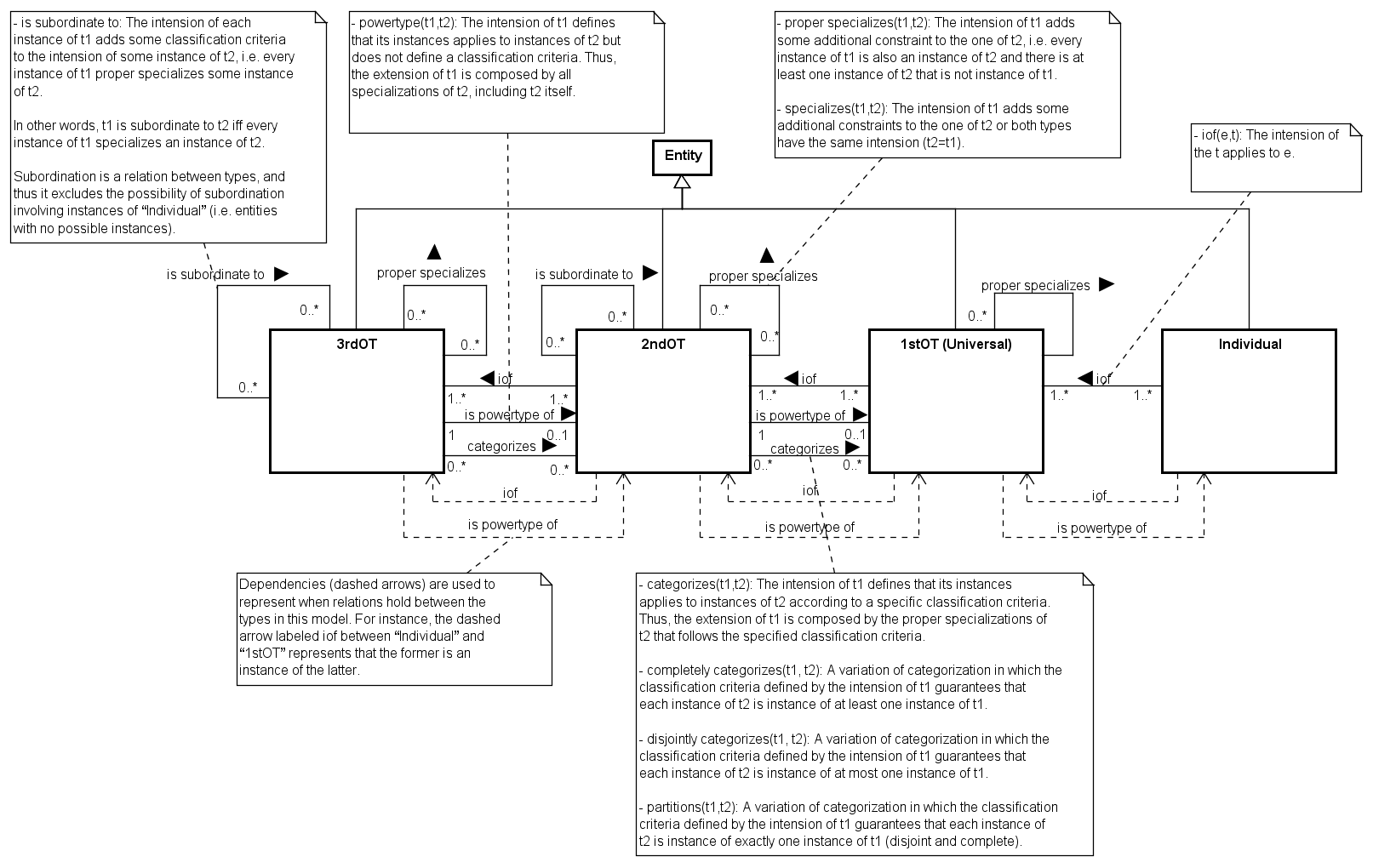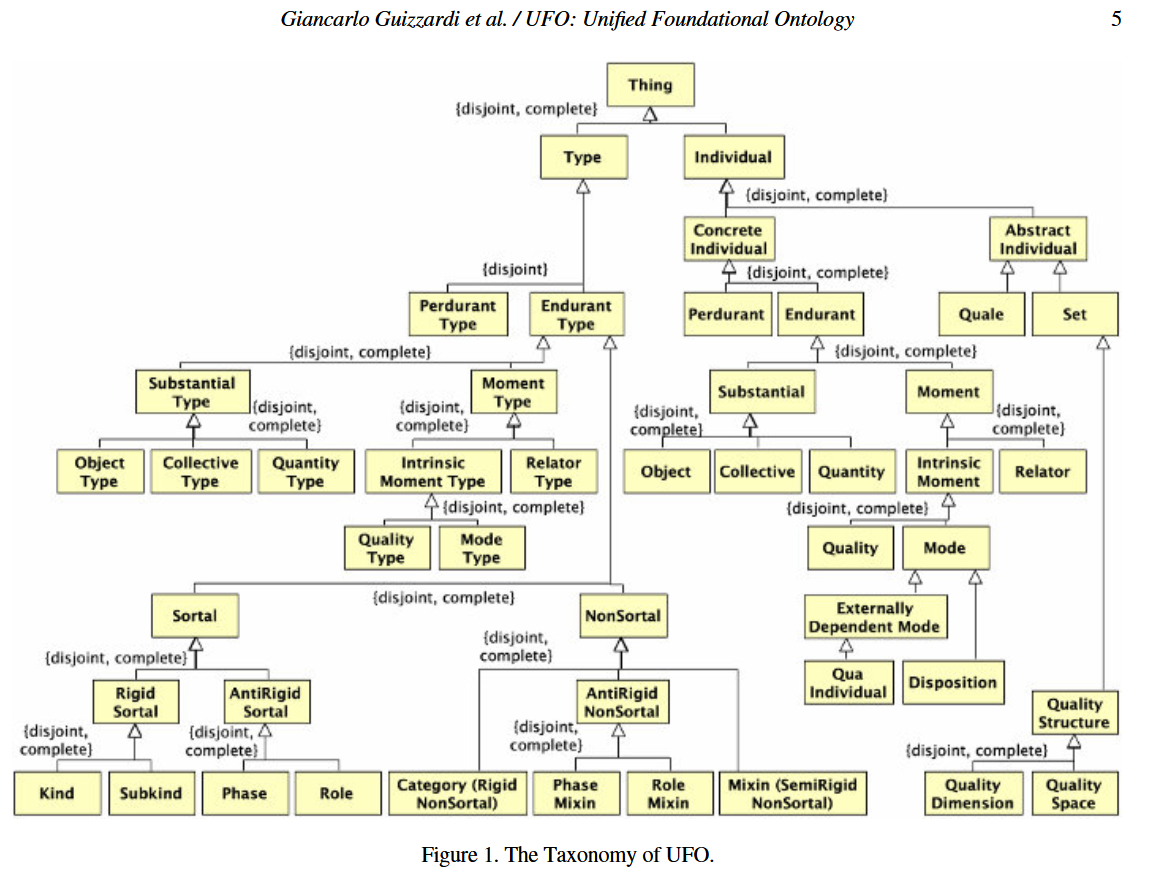Unified Foundational Ontology
- Upper Ontology
- url:
- similar: gUFO Sumo GFO DOLCE
- related: OntoUML eUFO Seon Software Engineering Ontology Network
- based_on: DOLCE GFO OntoClean
- repo: https://github.com/unibz-core/ufo-formalization
- docs: A First Order Logic Formalization of the Unified Foundational Ontology


Issues
- no OWL or any other machine-readable represenation
- but gUFO
- Are All Relations Instances of Either Material Relationship Type or Comparative Relationship Type
Features
- From gUFOGo to text →
-
A key feature of UFO (and hence, gUFO) is that it includes two taxonomies: one with classes whose instances are individuals (classes in this taxonomy include gufo:Object, gufo:Event) and another with classes whose instances are types (classes in this taxonomy include gufo:Kind, gufo:Phase, gufo:Category).
-
Relations
- "We divide relations into two broad categories, called Material and Formal relations."
- Formal relations hold between two or more entities directly without any further intervening individual. Examples of formal relations are:
- 5 is greater than 3
- this day is part of this month
- N is subset of Q
- but also the relations of instantiation, inherence, quale of a quality, association, existential dependence, among others – … relations that form the mathematical superstructure of our framework. Material relations, conversely, have material structure on their own and include examples such as:
- employments
- kisses
- enrollments
- flight connections
- commitments
- Formal relations hold between two or more entities directly without any further intervening individual. Examples of formal relations are:
Composition
- UFO-A: An Ontology of Endurants dealing with aspects of structural conceptual modeling. It is organized as a Four Category ontology comprising theories of Types and Taxonomic Structures connected to a theory of object identifiers (including a formal semantics in a Sortal Quantified Modal Logics), Part-Whole Relations, Particularized Intrinsic Properties, Attributes and Attribute Value Spaces (including a theory of Datatypes as Measure Structures), Particularized Relational Properties and Relations and Roles;
- UFO-B: An Ontology of Perdurants (Events, Processes) dealing with aspects such as Perdurant Mereology, Temporal Ordering of Perdurants, Object Participation in Perdurants, Causation, Change and the connection between Perdurants and Endurants via Dispositions;
-
UFO-C: An Ontology of Simple Intentional and Social Entities, which is constructed on top of UFO- A and UFO-B, and which addresses notions such as Beliefs, Desires, Intentions, Goals, Actions, Commitments and Claims, Social Roles and Social Particularized Relational Complexes (Social Relators), among others.
-
UFO-S: Services
Resources
References
- https://ontouml.readthedocs.io/en/latest/intro/ufo.html
- A Unified Foundational Ontology and some Applications of it in Business Modeling
- Ontological Foundations for Structural Conceptual Models
- Towards Ontological Foundations for Agent Modeling Concepts Using Ufo
- Towards Ontological Foundations for Conceptual Modeling the Unified Foundational Ontology Ufo Story
- Ufo Unified Foundational Ontology
- Endurant Types in Ontology Driven Conceptual Modeling towards onto Uml 2 0
- https://dev.nemo.inf.ufes.br/seon/UFO.html
- t.2024.08.27.09 finally made the connection of the MLT sub-ontology with Multi-Level Theory
Children
Backlinks
- Endurant Types in Ontology Driven Conceptual Modeling towards onto Uml 2 0
- Foundational Ontologies in Action
- Incorporating Types of Types in Ontology Driven Conceptual Modeling
- Ml2 an Expressive Multi Level Conceptual Modeling Language
- Reification and Truthmaking Patterns
- Roles and Their Three Facets a Foundational Perspective
- Some Open Issues after Twenty Years of Formal Ontology
- Towards an Ontological Foundation of Discrete Event Simulation
- Towards Ontological Foundations for Conceptual Modeling the Unified Foundational Ontology Ufo Story
- DESO
- DOLCE
- Seon Software Engineering Ontology Network